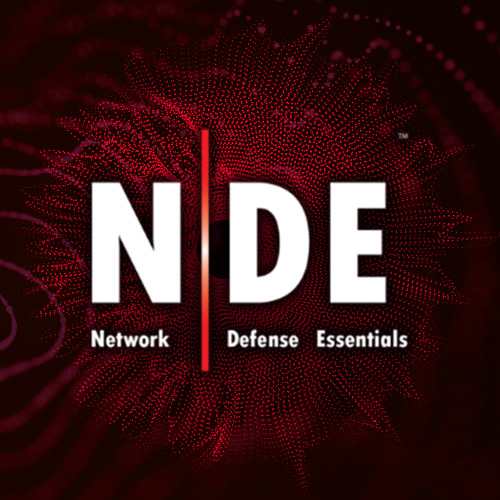
Network Defense Essentials
Network Defense Essentials is an introductory cybersecurity course that covers the fundamental concepts of information security and network defense. Those who are interested in pursuing a career in information security will learn the various fundamentals of information security and network defense, as well as what to expect in the field of network defense. The interactive labs component of this course ensures that student receive the hands-on, practical experience to give them the skills necessary for a future in cybersecurity.
Learn a holistic overview of the key components of information security such as Identification, Authentication and Authorization, Virtualization and Cloud Computing, Wireless Network, Mobile Device and IoT Device and Data Security. This active learning course ensures that students receive the hands-on, practical experience required to give them the skills necessary for a future in cybersecurity.
Everyone learns differently, so we offer on-demand, live, and several other options to customize your training based on your learning style. Build your package below.
Single On-Demand
Certification Course
Starting at
$299
Unlimited
Certification Courses
Starting at
$3,499
Have
Questions?
Call us at
1-888-330-HACK
About the Network Defense Essentials Course
Course Outline
- Network Security Fundamentals
- Identification, Authentication and Authorization
- Administrative Controls
- Physical Controls
- Technical Controls
- Virtualization and Cloud Computing
- Wireless Network Security
- Mobile Device Security
- IoT Device Security
- Cryptography and PKI
- Data Security
- Network Traffic Monitoring
-
-
- Discuss fundamental concepts of network security, including Information Assurance (IA)
principles, network defense challenges, defense approaches, security controls, and
review essential network security protocols. - Discuss access control principles, terminologies, and models, and describe Identity and
Access Management (IAM) concepts. - Examine various administrative network defense controls, including frameworks, laws,
acts, and security policies. - Examine various physical network defense controls, including physical security controls,
workplace security, and environmental controls. - Examine various technical network defense controls, including network segmentation,
firewall, IDS/IPS, honeypot, proxy server, VPN, SIEM, UBA, and anti-malware. - Comprehend fundamental virtualization concepts, Virtualization Security Concerns,
cloud computing, and suggest security best practices.
- Discuss fundamental concepts of network security, including Information Assurance (IA)
-
-
-
- Explain wireless network fundamentals, different types of wireless encryption, and
suggest security measures. - Discuss various mobile device connection methods, Mobile Device Management
concepts, common mobile usage policies, examine different security risks, and review
general security guidelines and best practices for mobile platforms. - Discuss working of IoT devices, application areas, communication models, IoT security
principles, IoT framework security considerations, IoT device management, and identify
IoT security best practices. - Discuss cryptography techniques, various cryptographic algorithms, and Public Key
Infrastructure (PKI), and use various cryptography tools to protect information. - Discuss data security concepts, the importance of data encryption, data loss prevention,
and compare different data backup concepts and technologies. - Discuss the need and advantages of network traffic monitoring, determine baseline traffic
signatures for normal and suspicious network traffic, and perform network monitoring for
suspicious traffic.
- Explain wireless network fundamentals, different types of wireless encryption, and
-
Passing Score
In order to maintain the high integrity of our certification exams, EC-Council Exams are provided in multiple forms (I.e. different question banks). Each form is carefully analyzed through beta testing with an appropriate sample group under the purview of a committee of subject matter experts that ensure that each of our exams not only has academic rigor but also has “real world” applicability. We also have a process to determine the difficulty rating of each question. The individual rating then contributes to an overall “Cut Score” for each exam form. To ensure each form has equal assessment standards, cut scores are set on a “per exam form” basis. Depending on which exam form is challenged, cut scores can range from 60% to 78%.
Exam Details
-
-
- Exam Length: 2 Hours
- Exam Format: Multiple Choice
- Exam Platform: ECC Exam Center
- # of Questions: 75
- Certification: Network Defense Essentials
-
-
-
- Help Desk Technician
- Technical Support Specialist
- Desktop Support Technician
- Cyber Crime Analyst
- Cybersecurity Specialist
- Cybersecurity Technician
- Desktop Support
- Desktop Support Technician
-
-
-
- Network Administrator
- Incident & Intrusion Analyst
- IT Security Specialist
- Network Technical Specialist
- Cyber Forensic Specialist
- Intelligence Operations Specialist
- Cyber Operations Technician
-
For more information, fill out the form below
and a training consultant will contact you.
For more information, fill out the form below
and a training consultant will contact you.
"*" indicates required fields
For more information, fill out the form below
and a training consultant will contact you.
"*" indicates required fields
For more information, fill out the form below
and a training consultant will contact you.
"*" indicates required fields

